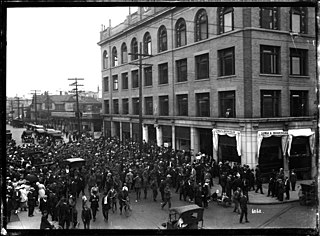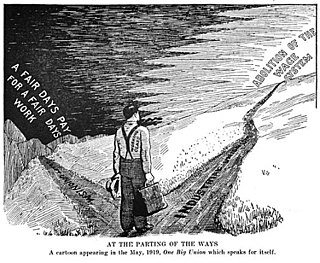
A fair day's wage for a fair day's work is an objective of the labor movement, trade unions and other workers' groups, to increase pay, and adopt reasonable hours of work. It is a motto of the American Federation of Labor.

A fair day's wage for a fair day's work is an objective of the labor movement, trade unions and other workers' groups, to increase pay, and adopt reasonable hours of work. It is a motto of the American Federation of Labor.
In 1881 Frederick Engels criticised the slogan in the first issue of The Labour Standard . He argued that workers exchange their full labour power for a day in return for the subsistence necessary to maintain them for a day: "The workman gives as much, the Capitalist gives as little, as the nature of the bargain will admit." He also points out that capitalists can force a better bargain as they can live off their capital, but workers, without reserves, will be forced to accept work at a less advantageous rate. As innovation continually replaces workers with machines, he argues, workers come to form an industrial reserve army. Further, he argues that the wealth of capitalists has been accumulated through the exploitation of workers. He ends up calling for the old motto to be buried for ever and replaced by another motto: "Possession of the Means of Work, Raw Material, Factories, Machinery, By the Working People Themselves." [1]
That critique was taken up by the Industrial Workers of the World, who embodied it in their preamble:
Labour laws, labour code or employment laws are those that mediate the relationship between workers, employing entities, trade unions, and the government. Collective labour law relates to the tripartite relationship between employee, employer, and union.

Wage slavery is a term used to criticize exploitation of labor by business, by keeping wages low or stagnant in order to maximize profits. The situation of wage slavery can be loosely defined as a person's dependence on wages for their livelihood, especially when wages are low, treatment and conditions are poor, and there are few chances of upward mobility.
Collective bargaining is a process of negotiation between employers and a group of employees aimed at agreements to regulate working salaries, working conditions, benefits, and other aspects of workers' compensation and rights for workers. The interests of the employees are commonly presented by representatives of a trade union to which the employees belong. A collective agreement reached by these negotiations functions as a labour contract between an employer and one or more unions, and typically establishes terms regarding wage scales, working hours, training, health and safety, overtime, grievance mechanisms, and rights to participate in workplace or company affairs. Such agreements can also include 'productivity bargaining' in which workers agree to changes to working practices in return for higher pay or greater job security.
Industrial unionism is a trade union organising method through which all workers in the same industry are organized into the same union, regardless of skill or trade, thus giving workers in one industry, or in all industries, more leverage in bargaining and in strike situations.

The Australian Council of Trade Unions (ACTU), originally the Australasian Council of Trade Unions, is the largest peak body representing workers in Australia. It is a national trade union centre of 46 affiliated unions and eight trades and labour councils. The ACTU is a member of the International Trade Union Confederation.

"Solidarity Forever", written by Ralph Chaplin in 1915, is a popular trade union anthem. It is sung to the tune of "John Brown's Body" and "The Battle Hymn of the Republic". Although it was written as a song for the Industrial Workers of the World (IWW), other union movements, such as the AFL–CIO, have adopted the song as their own. The song has been performed by musicians such as Utah Phillips, and Pete Seeger. It was redone by Emcee Lynx and The Nightwatchman. It is still commonly sung at union meetings and rallies in the United States, Australia and Canada, and has also been sung at conferences of the Australian Labor Party and the Canadian New Democratic Party. This may have also inspired the hymn of the consumer cooperative movement, "The Battle Hymn of Cooperation", which is sung to the same tune.
Labour power is the capacity to do work, a key concept used by Karl Marx in his critique of capitalist political economy. Marx distinguished between the capacity to do work, i.e. labour power, and the physical act of working, i.e. labour. Labour power exists in any kind of society, but on what terms it is traded or combined with means of production to produce goods and services has historically varied greatly.
Labor aristocracy or labour aristocracy has at least four meanings: (1) as a term with Marxist theoretical underpinnings; (2) as a specific type of trade unionism; (3) as a shorthand description by revolutionary industrial unions for the bureaucracy of craft-based business unionism; and (4) in the 19th and early 20th centuries was also a phrase used to define better-off members of the working class.

Wage labour, usually referred to as paid work, paid employment, or paid labour, refers to the socioeconomic relationship between a worker and an employer in which the worker sells their labour power under a formal or informal employment contract. These transactions usually occur in a labour market where wages or salaries are market-determined.

Criticism of capitalism is a critique of political economy that involves the rejection of, or dissatisfaction with the economic system of capitalism and its outcomes. Criticisms typically range from expressing disagreement with particular aspects or outcomes of capitalism to rejecting the principles of the capitalist system in its entirety.
Reserve army of labour is a concept in Karl Marx's critique of political economy. It refers to the unemployed and underemployed in capitalist society. It is synonymous with "industrial reserve army" or "relative surplus population", except that the unemployed can be defined as those actually looking for work and that the relative surplus population also includes people unable to work. The use of the word "army" refers to the workers being conscripted and regimented in the workplace in a hierarchy under the command or authority of the owners of capital.

Ex parte H.V. McKay, commonly referred to as the Harvester case, is a landmark Australian labour law decision of the Commonwealth Court of Conciliation and Arbitration. The case arose under the Excise Tariff Act 1906 which imposed an excise duty on goods manufactured in Australia, £6 in the case of a stripper harvester, however if a manufacturer paid "fair and reasonable" wages to its employees, it was excused from paying the excise duty. The Court therefore had to consider what was a "fair and reasonable" wage for the purpose of the act.

Capital. A Critique of Political Economy. Volume I: The Process of Production of Capital is the first of three treatises that make up Das Kapital, a critique of political economy by the German philosopher and economist Karl Marx. First published on 14 September 1867, Volume I was the product of a decade of research and redrafting and is the only part of Das Kapital to be completed during Marx's life. It focuses on the aspect of capitalism that Marx refers to as the capitalist mode of production or how capitalism organises society to produce goods and services.

Labor relations or labor studies is a field of study that can have different meanings depending on the context in which it is used. In an international context, it is a subfield of labor history that studies the human relations with regard to work in its broadest sense and how this connects to questions of social inequality. It explicitly encompasses unregulated, historical, and non-Western forms of labor. Here, labor relations define "for or with whom one works and under what rules. These rules determine the type of work, type and amount of remuneration, working hours, degrees of physical and psychological strain, as well as the degree of freedom and autonomy associated with the work." More specifically in a North American and strictly modern context, labor relations is the study and practice of managing unionized employment situations. In academia, labor relations is frequently a sub-area within industrial relations, though scholars from many disciplines including economics, sociology, history, law, and political science also study labor unions and labor movements. In practice, labor relations is frequently a subarea within human resource management. Courses in labor relations typically cover labor history, labor law, union organizing, bargaining, contract administration, and important contemporary topics.

The Industrial Workers of the World (IWW) is a union of wage workers which was formed in Chicago in 1905 by militant unionists and their supporters due to anger over the conservatism, philosophy, and craft-based structure of the American Federation of Labor (AFL). Throughout the early part of the 20th century, the philosophy and tactics of the IWW were frequently in direct conflict with those of the AFL concerning the best ways to organize workers, and how to best improve the society in which they toiled. The AFL had one guiding principle—"pure and simple trade unionism", often summarized with the slogan "a fair day's pay for a fair day's work." The IWW embraced two guiding principles, fighting like the AFL for better wages, hours, and conditions, but also promoting an eventual, permanent solution to the problems of strikes, injunctions, bull pens, and union scabbing.
In Marxist theory and Marxian economics, the immiseration thesis, also referred to as emiseration thesis, is derived from Karl Marx's analysis of economic development in capitalism, implying that the nature of capitalist production stabilizes real wages, reducing wage growth relative to total value creation in the economy. Even if real wages rise, therefore, the overall labor share of income decreases, leading to the increasing power of capital in society.
In Marxian economics, surplus value is the difference between the amount raised through a sale of a product and the amount it cost to manufacture it: i.e. the amount raised through sale of the product minus the cost of the materials, plant and labour power. The concept originated in Ricardian socialism, with the term "surplus value" itself being coined by William Thompson in 1824; however, it was not consistently distinguished from the related concepts of surplus labor and surplus product. The concept was subsequently developed and popularized by Karl Marx. Marx's formulation is the standard sense and the primary basis for further developments, though how much of Marx's concept is original and distinct from the Ricardian concept is disputed. Marx's term is the German word "Mehrwert", which simply means value added, and is cognate to English "more worth".
The labour movement is the collective organisation of working people to further their shared political and economic interests. It consists of the trade union or labour union movement, as well as political parties of labour. It can be considered an instance of class conflict.
Engels' pause is a term coined by economic historian Robert C. Allen to describe the period from 1790 to 1840, when British working-class wages stagnated and per-capita gross domestic product expanded rapidly during a technological upheaval. Allen named the period after German philosopher Friedrich Engels, who describes it in The Condition of the Working Class in England. Economists have analyzed its causes and effects since the nineteenth century, with some questioning its existence. Twenty-first-century technological upheaval and wage stagnation have led economists and academics to draw parallels between the two periods.